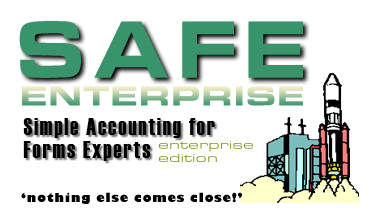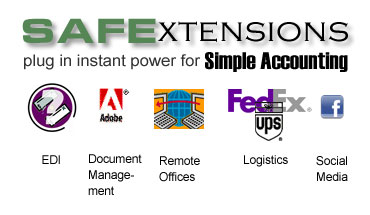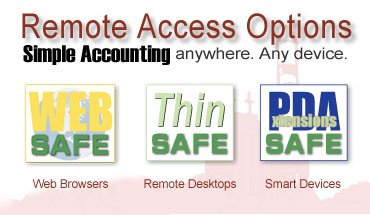Form Letters are a not all that sophisticated form of what used to be called ‘mail merge’. They let you merge the data fields of
- Contacts
- Customers
- Employees
- Sites
- Vendors
into a Script creating a long output document in Rich Text Format with one page per merged record. The merged output appears in a Rich Text Editing Window and may then be printed as is, or more commonly, copied and pasted into a dedicated word processor for final polish before mailing.
Despite our underwhelming first sentence, Form Letters can be quite useful. They are for quick and dirty applications where complex formatting is not needed. For applications where more polish is required, one can use the Export function to create a data source for more comprehensive programs such as Microsoft Word.
Procedure
Like many processes in Simple Accounting, you start Form Letters from the Browse of the data you wish to merge. The option is always found on the Print button.
 By default, the Form Letter option is disabled in each Print menu. Your administrator must enable it using the Setup|Security Template screen.
By default, the Form Letter option is disabled in each Print menu. Your administrator must enable it using the Setup|Security Template screen.
STEP #1: TAG RECORDS
Your first step is to make certain you have tagged the records you wish to merge. The Form Letter function will only generate a merge from records which are tagged so do this before doing anything else.
Use the Query Tab to limit which customers are displayed in the browse. Then press the Tag All button.
STEP #2: PROCEED
Now, select Form Letters from the Print button pop-up menu in your chosen browse. You’ll see a blank Rich Text Editing Window and a Proceed button. Press this button.
Next, a Script Browse will appear. Select the Script you wish to merge with.
You’ll now see an hourglass and much activity on your screen. After a few seconds, the Rich Text Editing Window will display with the merged data.
STEP #3: COPY, SAVE OR PRINT
At this point, you can either print the merged output, save it to a new Rich Text File (RTF) or copy it’s contents to the Windows Clipboard for pasting into another application.



